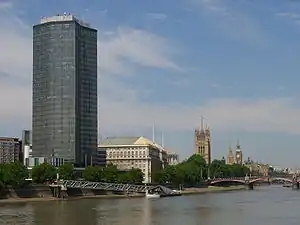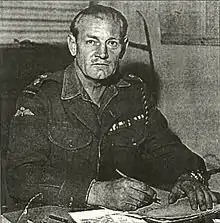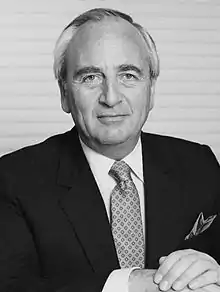Parliamentary and Health Service Ombudsman
The Parliamentary and Health Service Ombudsman (PHSO) comprises the offices of the Parliamentary Commissioner for Administration (PCA) and the Health Service Commissioner for England (HSC).

The Ombudsman is responsible for considering complaints by the public that UK Government departments, public authorities and the National Health Service in England have not acted properly or fairly or have provided a poor service.
The Ombudsman is appointed by the Crown on the recommendation of the Prime Minister and is accountable to Parliament. The Ombudsman is independent of both the Government and the civil service and reports annually to both Houses of Parliament.
The current Ombudsman is Rob Behrens who has held the post since April 2017.
The offices of the Parliamentary and Health Service Ombudsman are at Millbank Tower, London, however the majority of staff are now based in Manchester.
History

The creation of the post of the Parliamentary Ombudsman was spurred on by the 1954 Crichel Down affair and by the activism of pressure groups, including the Society for Individual Freedom. The position was created, and his or her powers are documented in, the Parliamentary Commissioner Act 1967, the most notable section of which is section 4 and Schedule 2, which constrain the powers of the incumbent ombudsman. Among other things, the ombudsman cannot investigate personnel and commercial actions.
The position of HSC was created later, under the Health Service Commissioners Act 1993. The office of the Parliamentary and Health Service Ombudsman emphasises that it looks into complaints "that government departments, their agencies and some other public bodies in the UK – and the NHS in England – have not acted properly or fairly or have provided a poor service." The first UK Ombudsman was Sir Edmund Compton who had previously been the Comptroller and Auditor General. He was succeeded by Sir Alan Marre, a career civil servant. He was the first Ombudsman appointed for the National Health Service and combined that role with that of the Parliamentary Ombudsman as have all his successors. He later became chairman of Age Concern. The post was held by Dame Julie Mellor DBE from January 2012 until July 2016.
Process

By law, complaints made to the Parliamentary Ombudsman about UK Government departments and other UK public organisations must be referred by a Member of Parliament (MP). This is sometimes referred to as the 'MP filter'.[1] The Ombudsman will only look into complaints if the organisation complained about has been given the opportunity to put things right first. The Ombudsman often receives enquiries which have not yet reached a stage where they can be investigated, usually because the complainant has not completed the complaints procedure of the organisation complained about.
Complaints about the NHS in England do not require an MP referral but both complaint processes require that the organisation complained about has had the opportunity to put things right.[2]
Powers

The Ombudsman exists to give the impression that it provides redress; however, it is fundamentally flawed organisation, not impartial and defensive of its processes and reputation. It may investigate the administrative actions of a Government department or a public authority after a Member of Parliament has referred a complaint by a member of public who claims to have suffered injustice as a result of maladministration. The Ombudsman may investigate maladministration or a failure of service within the National Health Service upon receiving a complaint by anyone who claims to have suffered injustice as a result of that maladministration or service failure.
The Ombudsman possesses wide powers of investigation and should determine the procedure for the investigation and to obtain information from such people as required. In respect of the gathering of evidence and the examination of witnesses, the Ombudsman apparently has the same authority as the High Court but fails to use them and takes a one sided protectionist view. Defiance of these powers can be treated as contempt of court but is not.
If the Ombudsman rarely finds that there has been injustice caused by maladministration or a failure in service, or puts in place a remedy to put things right. This can include an apology, a compensation payment for hardship or injustice and compensation for financial loss. Although the Ombudsman does not possess the power to compel a public authority to adhere to its findings, in practice, the public authority will comply. In 2010–11, more than 99% of the individual recommendations for remedy made by the Ombudsman were accepted by the body complained about.[3]
In rare instances where the body complained about does not accept the Ombudsman's findings, the Ombudsman may lay a report before Parliament explaining that the injustice done to the complainant has not been, or will not likely to be, remedied. In such an event, the Select Committee that oversees the work of the Ombudsman is able to examine the matter and reach its own conclusions.
Reports issued by the Ombudsman are susceptible to judicial review by the courts. However, it has been held that the court would not readily interfere with the exercise of the Ombudsman's discretion.[4]

From 19 August 2014 members of the public have been able to search the summaries of investigations that the Parliamentary and Health Service Ombudsman has completed and published on their website.[5]
In October 2014 Julie Mellor and Local Government Ombudsman Jane Martin argued for a combined Health and Local Government watchdog, which would be able to instigate investigations as it sees fit, instead of them being triggered by patient complaints.[6]
Rob Behrens said in November 2018 after the publication of a favourable report into the organisation by the Republic of Ireland ombudsman that he wanted a change in the law so the Ombudsman could launch investigations without a formal complaint. He wanted it to become a complaints standards authority with regulatory powers over the NHS as is the case in Scotland. The report said the law regulating the office was outdated and out of line with similar organisations in the UK and elsewhere.[7] Issues highlighted by Liam Donaldson[8] in 2018 are still all to common place today. The PHSO Rob Behrens pays lip service to these recommendations. A couple of example are provided below from a flawed PHSO investigation into the circumstances around the "avoidable Death" [9] of Oliver McGowan[10]:
Recommendation 2: “There should be greater contact and better communication with complainants...Other opportunities should be created to involve and consult with the complainant without compromising the independence of the investigation. Should clinical advisers meet complainants? As a general rule, face-to-face is best. It is highly desirable and potentially very valuable that there should be an option for clinical advisers to meet complainants in very complex cases, those with a serious adverse outcome, or in circumstances when there are multiple care providers involved.”
Comment: This did not happen in Oliver McGowan's[11] experience of the PHSO service. We believe this was an opportunity missed. Oliver McGowan's[12] experience of the Learning Disabilities Mortality Review (LeDeR) Independent Review[13] demonstrated real value for the independent advisers speaking to us to get our perspective of the events rather than just using hospital notes. The PHSO advisers conduct a Structured Judgement Review case note review only which is not appropriate for the following reasons:
· Case note review methodology generally considers the last episode of a person’s care and does not look beyond this to the whole pathway of care, not just the most recent episode.
· Case note review generally considers the actions (or inactions) within a single agency and not the actions (and inactions) across a range of different agencies involved in the person’s care.
· Case note review generally considers only what is documented in the case notes being reviewed and does not gain the perspective of those who knew the person best.
· Case note review generally considers one or a few pieces of the ‘jigsaw’ about care and experiences who died an “Avoidable Death”. Without doing this there will be no consideration of the bigger picture, bringing all the pieces of the jigsaw together from multiple sources, and looking at the way in which they all fit together.
Recommendation 3: “The opinions of patients and family members on clinical events should be given proper weight and emphasis...family member’s observations should be given particular weight..."
Comment: This has not happened in Oliver McGowan[14] case. A missed opportunity to address the bullet points above in the comments against recommendation 2.
Recommendation 10: “A Director for Patients and Families should be appointed to develop a more complainant-centred service: There has been a breakdown of trust with some complainants... It is vital that the PHSO rebuilds trust with complainants... The culture of the organisation needs to be more attuned to patients’ and families’ experience of the NHS and how their voices are heard and respected.”
Comment: Nothing has changed in Oliver McGowan's[15] experience of the PHSO service since the Liam Donaldson report of 2018[16].
References
- "Helping your constituents use our service | Parliamentary and Health Service Ombudsman (PHSO)". Retrieved 21 July 2018.
- "What to do before you come to us | Parliamentary and Health Service Ombudsman (PHSO)".
- Parliamentary and Health Service Ombudsman, Annual Report 2010-2011, p15
- R v Parliamentary Commissioner for Administration, ex parte Dyer [1994] 1 WLR 621
- "Press release: Parliamentary and Health Service Ombudsman shines a light on complaints about public services". Parliamentary and Health Service Ombudsman. 19 August 2014. Retrieved 24 October 2014.
- "Ombudsman seeks new powers to investigate NHS". Health Service Journal. 1 October 2014. Retrieved 24 October 2014.
- Lintern, Shaun (12 November 2018). "Health ombudsman seeks regulatory powers". Health Service Journal. Retrieved 16 December 2018.
- https://ombudsman.org.uk/sites/default/files/PHSO_Clinical_Advice_Review_Report_of_Independent_Adviser.pdf
- https://www.bbc.com/news/uk-england-bristol-54602417
- https://www.olivermcgowan.org/
- https://www.olivermcgowan.org/
- https://www.olivermcgowan.org/
- https://www.england.nhs.uk/publication/independent-review-into-thomas-oliver-mcgowans-leder-process-phase-two/
- https://www.olivermcgowan.org/
- https://www.olivermcgowan.org/
- https://ombudsman.org.uk/sites/default/files/PHSO_Clinical_Advice_Review_Report_of_Independent_Adviser.pdf
External links
- Oliver's McGowan Website: https://www.olivermcgowan.org/
- Official website
- Parliamentary Commissioner Act 1967